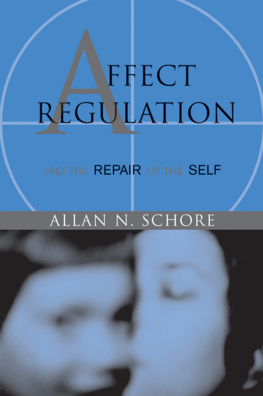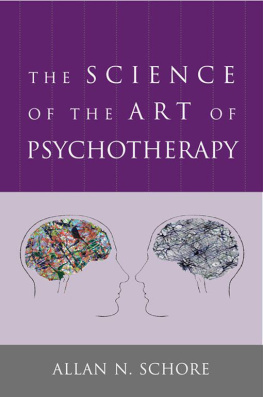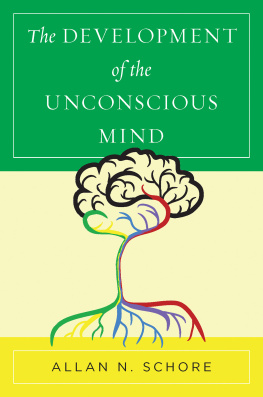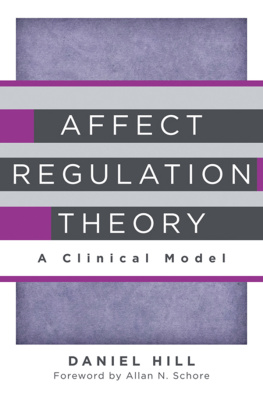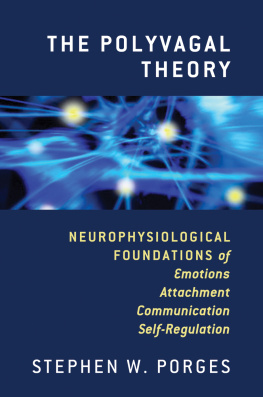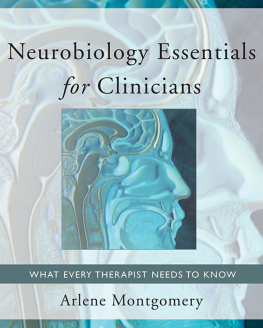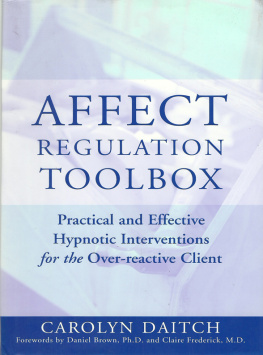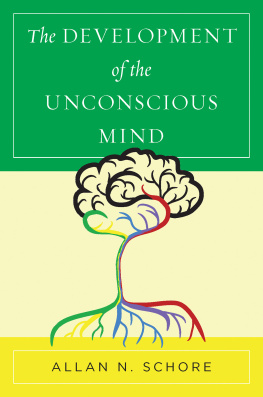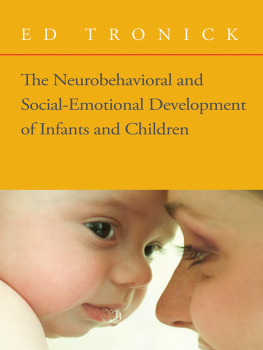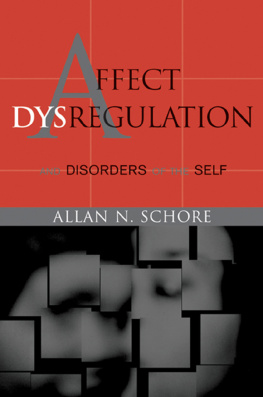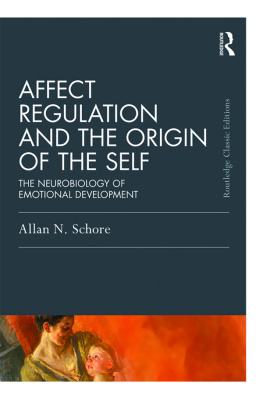
Affect Regulation
&
the Repair of the Self
ALLAN N. SCHORE

W.W. Norton & Company
New York London
To Beth, David, Suzy, and Amanda
Contents
The Norton Series on Interpersonal Neurobiology
Daniel J. Siegel, M.D., Series Editor
The field of mental health is in a tremendously exciting period of growth and conceptual reorganization. Independent findings from a variety of scientific endeavors are converging in an interdisciplinary view of the mind and mental well-being. An interpersonal neurobiology of human development enables us to understand that the structure and function of the mind and brain are shaped by experiences, especially those involving emotional relationships.
The Norton Series on Interpersonal Neurobiology will provide cutting-edge, multidisciplinary views that further our understanding of the complex neurobiology of the human mind. By drawing on a wide range of traditionally-independent fields of researchsuch as neurobiology, genetics, memory, attachment, complex systems, anthropology, and evolutionary psychologythese texts will offer mental health professionals a review and synthesis of scientific findings often inaccessible to clinicians. These books aim to advance our understanding of human experience by finding the unity of knowledge, or consilience, that emerges with the translation of findings from numerous domains of study into a common language and conceptual framework. The series will integrate the best of modern science with the healing art of psychotherapy.
A NORTON PROFESSIONAL BOOK
T HIS BOOK REPRESENTS the third volume of a triad on the critical relationship between affect regulation and the organization of the self. In my first book, Affect Regulation and the Origin of the Self, published in 1994, I outlined the principles of regulation theory. In that volume, after describing the psychoneurobiological mechanisms by which the attachment relationship facilitates the development of the major self-regulatory structures in the infants brain, I applied the developmental conception to models of psychopathogenesis and the psychotherapy process. In the companion to this volume, Affect Dysregulation and Disorders of the Self I have expanded the applications of regulation theory to developmental affective neuroscience and developmental neuropsychiatry. In this book, Affect Regulation and Repair of the Self, I offer further expositions in the fields of developmentally-oriented psychotherapy and developmental neuropsychoanalysis.
Over the course of what was known as the Decade of the Brain, neuroscience experienced a remarkable growth spurt in knowledge. This advance, due in part to new imaging technologies, occurred not only in cognitive neuroscience, but also in the burgeoning fields of affective and social neuroscience. The rich body of data that emerged from basic brain research, as well as from psychobiology and psychophysiology, was now, perhaps more so than any time before, relevant to clinicians. In the same period psychiatry was making significant advances in understanding the relationship between affect dysregulation and trauma, while psychotherapists, focusing on emotional processes, were generating more effective models for the treatment of early-forming self pathologies. Parallel to these trends, experimental and social psychology seriously addressed an area long seen as outside of its scientific provincethe domain of emotion. Similarly, developmental psychology, through its intensifying interest in attachment theory, increased the amount of research on social and emotional development in human infancy.
But perhaps what best characterizes the advances of the last 10 years in the life sciences is the tremendous acceleration of interdisciplinary research. This has allowed for the integration of data from a spectrum of different fields of study, each of which is attempting to more deeply understand the human condition. A prime example of this trend is seen in the fact that affect regulation and dysregulation are a common area of intense interest to researchers in the psychological, biological, medical, and social sciences, as well as to clinicians in psychiatry, psychology, and social work.
The integration of psychological and biological data is seen in contemporary models of the self, and there is a growing consensus that its origin must be explained in terms of the complexities of developmental psychology and developmental neuroscience. The ontogenesis of the human mind is now thought to involve more than the emergence of increasingly complex cognitions. Affective processes appear to lie at the core of the self, and due to the intrinsic psychobiological nature of these bodily-based phenomena recent models of human development, from infancy throughout the lifespan, are moving towards brain-mind-body conceptualizations. These models are redefining the essential characteristics of what makes us uniquely human.
Indeed, within the last ten years a shift has occurred in sciences focus regarding what it considers to be the essential attributes of the human condition. In an issue of the journal Science, Richard Davidson concluded, The self and personality, rather than consciousness, is the outstanding issue in neuroscience. So much of our behavior emerges from processes to which we have little conscious access (2002, p. 268). There is an intense interest in nonconscious processes, fundamental operations of the brain-mind-body that occur rapidly and automatically, beneath levels of conscious awareness. This specifically applies to the behavioral, cognitive, and particularly emotional processes that mediate the fundamental capacity for self-regulation.
The self-regulation of emotion is usually defined in terms of the conscious self-regulation of emotion, the set of control processes by which we influence, consciously and voluntarily, the emotions we have, when we have them, and how we experience and express these emotions. This conceptionthat we can change the way we feel by consciously changing the way we thinkis a primary corollary of the current dominant field in psychology, that is cognitive psychology. A secondary postulate is that rational thinking and the cooling attentional strategy of distraction are the major coping mechanisms for dampening down the hot negative emotional consequences of a distressing experience. The adaptive function of the amplification of positive emotion and the fundamental bodily-based operations that lie at the foundation of emotional processes are usually not addressed.
However, in contrast to this model of the down-regulation of emotion processing by conscious operations, a large body of studies indicates that most moment-to-moment psychological processing occurs nonconsciously. The essential self-regulatory functions that allow us to appraise and adapt to personally meaningful changes in the environment occur largely at levels beneath conscious awareness. Indeed, both researchers and clinicians are converging on the findings that rapidly communicated nonconscious social emotional information is primarily processed and acted upon at the implicit rather than the explicit level. In their clinical practice, psychotherapists of all persuasions are focusing upon both negative and positive hot rather than cool cognitions, and asserting that modifications in implicit relational knowledge and unconscious internal representations are the major changes in the psychotherapy context.
Researchers in social psychology are also exploring the important differences between implicit and explicit learning, as well as the direct relevance of the former to specifically social cognition. Cognition means knowing the world, but it is usually misinterpreted to signify only conscious verbal knowing. Much of the exchange of essential subjective information in human relationships is nonverbal, and includes dynamic changes in facial expression, prosodic tone of the voice, touch, gesture, and bodily state. These operations are essential to the functioning of the implicit (as opposed to the explicit) self.
Next page
